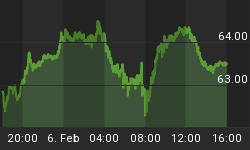This morning I had two interactions that I feel would be of interest to anyone trying, as I am, to figure out the true nature of the macro economy and the inflation/deflation dynamics embedded within it.
First, I received a call from a machine tool broker. He was just checking in. This sort of call usually leads to some conversation about the state of the overall manufacturing sector. In response to my query on the subject, he told me that he is very busy with liquidations (primarily of smaller companies for reasons I explained in Dawn of the Dead), but also that he is seeing very brisk business on the demand side, mostly from larger companies. In his words "Large manufacturers are buying capital assets."
I then had a conversation with the owner of L'ugs Always, a crafter of fine (I am a customer) classic jewelry (lugs_always@yahoo.com), who told me that most exhibitors at a large fair across many types of crafts, were seeing "half the business" this year as previous years. Can you think of many sectors more closely tied in to the consumers' whims than crafts? I can't.
Where is the demand coming from that was referenced by the machine broker, and how long will be its shelf-life? As most people who follow the economy know, the corporate sector (excluding those financial entities that have levered up to the credit bubble to dangerous levels) has spent the last two years cleaning up its balance sheets. The consumer, arguably far less economically sophisticated on average than the business sector, has treated the liquidity raining down from the monetary heavens like a bonanza. But there are signs, including our craft fair example noted above, that the consumer is getting a bit antsy.
Perhaps he is backing away from those under-performing assets in favor of that all-time winner, HOUSING! Housing has been spun as a safe haven, but ironically may be the sector most dangerously leveraged to pure unadulterated inflation through low interest rates and absurdly dangerous lending practice on a massive scale. The consumer is seeking haven in a potential tinder box. As I write, this headline from AP appears on my screen:
Stocks Turn Higher on Record Housing Data.
Now there is a reason to celebrate! If you are a speculator holding to distribute into blow-off tops in real estate, commodities and the stock market that is. The energy sectors are making new highs today. Gold has NOT given an all clear signal no matter how hard goldbugs wish. Gold, a monetary "commodity" is saying that fiscal restraint is still in motion. The Fed is forced to continue playing the good inflation fighting soldier in response to what anyone who chooses to see will call multi-asset bubbles. What does this mean...Anyone? Anyone? Beuller? Anyone? You know what it means.
Investing, and capital preservation for that matter are much more about what will be than what is or has been. Yes indeed, we have current effects of inflation everywhere we look. Housing, energy, healthcare, education, raw commodities and stocks. Business is apparently in a capital spending mode, but it will be important going forward to decipher how much of this is related to tax credits and profits gained through easy money, AKA inflation.
I have stated previously my belief in a secular deflationary impulse (the ongoing march of productivity and innovation which would diminish the NEED for new money created out of thin air) which is periodically carpet bombed with inflationary policy. In my opinion, we sit at one of those junctures whereby everyone is shouting from the rooftops "inflation blah blah blah!"....."deflation blah blah blah!", but it is critical to one's economic health to get the dynamics right. Which is the cart and which is the horse?
I lean toward a deflationary spook job in the near term as certain asset bubbles begin to unwind, to be followed by another inflationary stick save attempt later on. The wild card now as opposed to previous cycles is the levels of debt, derivatives and speculation woven into the mix. No matter what the stock market is doing, no matter what capital spending businesses are doing, the facts cannot be denied. The entire financial system is dangerously hopped up on potentially lethal vehicles for speculation and asset appreciation.
I invite you to try a free copy of biiwii's initial subscription Letter. It will progress and evolve over time with the goal of correctly interpreting the confusing dynamics currently at play in the macroeconomic environment.















